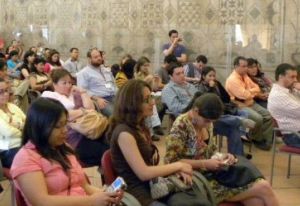Practical work experience for university students in Spain
If you're enrolled (in a bachelor's or master's course) in any Spanish university or in a school attached to a Spanish university, or if you come from a foreign university and are taking a course of study in Spain, you have the option of doing some practical work experience while you're studying.
If you want to further your education and try out the knowledge you've acquired during your years as a university student, and at the same time prepare for the future employment market, the best plan is to do some work experience.
You can do this by applying through the Spanish university where you're enrolled. You'll be able to do your work experience in companies, institutions or public and private organisations at the national and international level, as well as in the university itself.
You can choose between two types of work experience:
- External curricular work experience: those involving academic activities that are part of your syllabus.
- Extracurricular work experience: this is voluntary in nature, since although it pursues the same goals as curricular work experience, it is not part of the syllabus. In order to take up this option you must be enrolled in the subject linked to the syllabus corresponding to this work experience.
The duration will be determined by the corresponding syllabus in the case of curricular work experience. In the case of extracurricular work experience, the time dedicated cannot be over 50% of the academic year.
The schedules for the work experience will be established according to the characteristics and availability of the collaborating body where it is due to take place, but always with the aim of finding a timetable that's compatible with your studies.
Monitoring during the work experience and final report
During your period of work experience you'll be supervised by the university at all times, and also by a tutor from the collaborating body, and another academic tutor from the university whenever you want.
- In the case of external curricular work experience: the academic tutor will be a teacher from the university, preferably from the faculty, school or centre in which you are enrolled.
- In extracurricular work experience: the tutor will be preferably a professor from the university where the subject associated with the work experience is taught.
You should stay in contact with your academic tutor and notify him or her of any incident that may arise. You'll be required to present a final report at the end of the work experience, and in some cases an intermediate report, which is usually submitted halfway through the work experience period.
Academic recognition and financial remuneration
External work experience has a maximum extension of 60 credits. When you finish, you'll need to request a document certifying these credits from your university.
At the end of your period of work experience and your studies, you may be selected to join the staff of the collaborating organisation. However you should bear in mind that your work experience will not count towards your seniority, nor will it exclude you from the trial period.
Financial remuneration
Work experience is for training purposes, and thus the collaborating companies, institutions and organisations are not obliged to offer any financial reimbursement, although some agreements may establish funding in the form of study grants. In this case, the corresponding organisation will be required to register you with the Social Security system.
Things to remember
Before you start your work experience you need to have civil liability insurance from your university.
Universities tend to offer work experience in the second half of the syllabus, giving priority to students who do curricular work experience over those who apply for extracurricular work experience.
If you need more information or are interested in doing work experience, we recommend you visit the external work experience office at your university.









